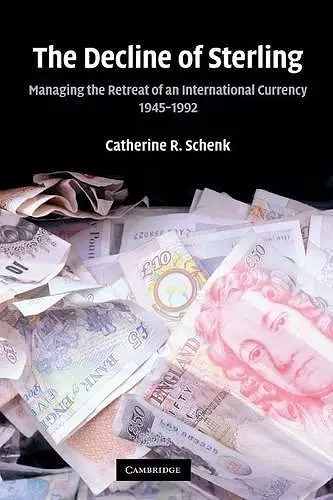The Decline of Sterling
Managing the Retreat of an International Currency, 1945–1992
Format:Paperback
Publisher:Cambridge University Press
Published:18th Jul '13
Currently unavailable, and unfortunately no date known when it will be back
This paperback is available in another edition too:
- Hardback£120.00(9780521876971)

This book challenges traditional explanations of the prolonged demise of sterling as an international currency after World War II.
The demise of sterling as an international currency was widely predicted after 1945, but the process took thirty years to complete. This book challenges traditional explanations of this demise by arguing that it was prolonged by the weakness of the international monetary system and by collective interest in its continuation.The demise of sterling as an international currency was widely predicted after 1945, but the process took thirty years to complete. Why was this demise so prolonged? Traditional explanations emphasize British efforts to prolong sterling's role because it increased the capacity to borrow, enhanced prestige, or supported London as a centre for international finance. This book challenges this view by arguing that sterling's international role was prolonged by the weakness of the international monetary system and by collective global interest in its continuation. Using the archives of Britain's partners in Europe, the USA and the Commonwealth, Catherine Schenk shows how the UK was able to convince other governments that sterling's international role was critical for the stability of the international economy and thereby attract considerable support to manage its retreat. This revised view has important implications for current debates over the future of the US dollar as an international currency.
'Catherine Schenk tells the story of the changing fortunes of sterling across the second half of the twentieth century. This ranges over everything from convertibility, reserve currencies, sterling balances, the euro-currency markets, the international financial architecture, and a great deal more. Sterling has also been placed in the context of the international monetary system, and in the context of the growing literature on the economic and wider history of the period. It is an excellent account of difficult territory.' Forrest Capie, Cass Business School and Official Historian of the Bank of England
'Anyone concerned about how to resolve the global imbalances in the international economy today needs to read Catherine Schenk's detailed study of the political and economic difficulties that bedevilled Britain's decades-long effort to eliminate the 'sterling problem' left over from World War II. Her detailed analysis of the issues that confronted British policymakers and how they were resolved shows how hard it is to correct global imbalances once they exist, even with the best of intentions and international cooperation. For, even if the stakes diminish over time, as they did with British sterling, the stake holders and their interests keep changing as well.' Larry Neal, University of Illinois, Urbana-Champaign
ISBN: 9781107612990
Dimensions: 229mm x 152mm x 23mm
Weight: 610g
464 pages